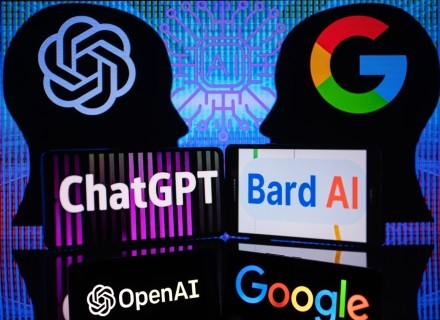In the rapidly evolving landscape of technology, Meta Platforms (META.O) has unveiled its ambitious plan to develop an artificial intelligence-based search engine, aiming to significantly reduce its dependence on established giants like Alphabet’s (GOOGL.O) Google and Microsoft’s (MSFT.O) Bing. According to a report from The Information on October 28, 2024, this strategic pivot reflects Meta’s intent to redefine the way users access information while positioning itself as a formidable competitor in the burgeoning AI search market.
Here's ads banner inside a post

The AI Search Engine Landscape: A Competitive Arena
The race for dominance in the AI search engine sector is heating up, with major players like OpenAI, Google, and Microsoft all competing aggressively. Each company is leveraging advanced AI technologies to enhance their search capabilities, thereby reshaping user experiences. As the digital world becomes increasingly reliant on AI, Meta’s entrance into this market raises intriguing questions about its future trajectory and the implications for consumers and competitors alike.

Here's ads banner inside a post
Meta’s forthcoming search engine will operate as a sophisticated web crawler, providing users with conversational answers about various topics, including current events. By integrating this functionality into its existing platforms—such as WhatsApp, Instagram, and Facebook—Meta aims to create a seamless user experience that prioritizes engagement and interactivity. Unlike traditional search engines that deliver a list of links and snippets, Meta’s approach seeks to answer user queries directly and contextually, enhancing user satisfaction and engagement.
![]()
Current Reliance on Established Search Engines: A Double-Edged Sword
Currently, Meta relies heavily on Google and Bing to provide users with answers to queries related to news, sports, and stock market information. This dependence poses several challenges, particularly as Meta grapples with its own content ecosystem while striving to maintain user engagement. By developing its own search engine, Meta gains greater control over information dissemination, allowing it to tailor responses and provide a more cohesive experience for its users.
Here's ads banner inside a post

This shift is also vital for Meta as it attempts to redefine its brand identity following various controversies that have plagued the company in recent years. Establishing a proprietary search engine not only enhances Meta’s technological capabilities but also reinforces its commitment to innovation and user-centric solutions. It allows the company to distance itself from the criticisms surrounding its reliance on external sources and to assert its position as a leader in technological advancement.
The Ethical and Legal Landscape: Navigating Challenges
While the prospects of launching a new AI search engine are exciting, the path forward is fraught with challenges. The competitive landscape is not only intense but also raises ethical and legal implications. Concerns surrounding copyright infringement and fair compensation for content creators have emerged as significant issues, particularly as companies scrape web data to train their AI models.
As Meta prepares to launch its search engine, it must navigate these complexities carefully to build a sustainable and ethical business model. The company has already indicated that its AI chatbot will leverage content from reputable sources like Reuters to provide real-time answers about current events. This strategy highlights the necessity of establishing partnerships with content creators and media organizations to ensure that its search engine delivers accurate and reliable information.

However, Meta will need to tread carefully. The debate surrounding content ownership and compensation is contentious, and how Meta addresses these concerns will be pivotal in determining the success of its AI search engine. If Meta can strike the right balance between data utilization and respecting intellectual property rights, it may pave the way for a more ethical and sustainable AI ecosystem.
Innovations and Technological Advances: A New Frontier
As Meta develops its AI search capabilities, the company is likely to draw inspiration from the latest advancements in AI technology. Google is currently integrating its cutting-edge AI model, Gemini, into its core products, enhancing search functionality and user experience. Similarly, OpenAI, backed by Microsoft, leverages Bing to access the web and deliver relevant responses to users, showcasing the significance of strategic partnerships in this domain.

Meta’s entry into the AI search engine market coincides with a broader trend towards more sophisticated AI applications across various industries. The advancements in natural language processing (NLP) and machine learning enable AI systems to understand and respond to human queries with increasing accuracy and relevance. By capitalizing on these innovations, Meta has the potential to create a search engine that not only meets user needs but also anticipates them, delivering personalized and contextually aware responses.
User Experience and Expectations: Redefining Information Retrieval
The implications of Meta’s move extend beyond its platforms; a successful AI search engine could redefine how users interact with information across the internet. If Meta can deliver on its promise of providing conversational and contextually relevant answers, it may alter user expectations for search functionality more broadly. The emphasis on direct answers rather than traditional link-based responses may create a paradigm shift in how users perceive and engage with search engines.
Furthermore, this development could compel existing search engine providers to enhance their offerings, leading to increased competition in the market. The potential for improved services could ultimately benefit users, fostering an environment where information retrieval becomes more personalized and user-friendly.
The Future of Meta’s AI Search Engine: Potential and Pitfalls
As Meta embarks on this ambitious journey to create its own AI search engine, the tech world watches closely. The stakes are high, and the potential rewards are significant—not only for Meta but also for users seeking a more integrated and conversational search experience. The company must leverage its vast trove of user data and engagement metrics effectively to create a search engine that resonates with its audience while maintaining ethical standards.

However, the challenges that lie ahead cannot be overlooked. Meta must address the legal and ethical implications of content usage, navigate the complexities of the competitive landscape, and ensure that its AI models are trained responsibly and sustainably. The path to success will require strategic partnerships, a commitment to ethical practices, and an unwavering focus on user experience.
In conclusion, Meta’s foray into AI search represents a significant evolution in the tech landscape, with the potential to reshape how users interact with information online. As the battle for AI search supremacy intensifies, Meta’s ability to innovate and adapt will determine its success in this new frontier. Whether Meta can navigate the challenges ahead and emerge as a leader in this burgeoning market remains to be seen, but one thing is clear: the quest for dominance in AI search has officially begun, and its outcome could have far-reaching implications for the digital world.

